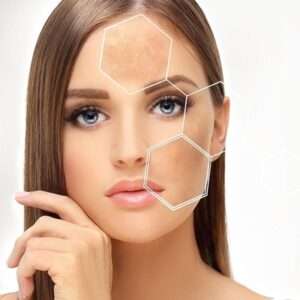
Hyperpigmentation and dark spots are among the most common skin concerns that I see in my dermatology practice. Whether caused by sun damage, acne scarring, hormonal changes, or aging, these spots can significantly affect one’s confidence and overall complexion. Among the growing number of skincare ingredients being marketed for skin lightening, glutathione has gained significant attention — especially for its skin-brightening and anti-aging claims.
But the question remains: Does glutathione actually lighten dark spots? As a dermatologist, I believe in evidence-based answers. Let’s take a closer look at the science, benefits, and limitations of glutathione for skin lightening.
What is Glutathione?
Glutathione is a powerful antioxidant naturally produced by the liver. It plays a critical role in detoxification, immune support, and neutralizing harmful free radicals in the body. Structurally, it’s a tripeptide made up of three amino acids: glutamine, glycine, and cysteine.
In skincare and dermatology, glutathione is primarily known for its skin-brightening properties — and more recently, it’s been promoted for reducing dark spots and melasma.
How Does Glutathione Work on the Skin?
The skin-lightening effect of glutathione is believed to come from its ability to:
Inhibit Melanin Production:
Melanin is the pigment responsible for giving our skin, hair, and eyes their color. Dark spots form when melanin production becomes uneven or excessive in certain areas (a process called hyperpigmentation).
Glutathione inhibits the enzyme tyrosinase, which is crucial in melanin synthesis. By reducing tyrosinase activity, glutathione indirectly helps reduce the appearance of dark spots over time.Shift Melanin Production from Eumelanin to Pheomelanin:
Glutathione encourages the skin to produce more pheomelanin (a lighter pigment) and less melanin (a darker pigment). This shift contributes to an overall brighter and more even skin tone.
Fight Oxidative Stress:
Oxidative stress caused by free radicals can worsen pigmentation. As an antioxidant, glutathione protects the skin from environmental damage, reducing the chances of new dark spots forming.
Forms of Glutathione in Skincare & Aesthetic Medicine
There are three main ways glutathione is administered for skin benefits:
Oral Supplements
These are among the most popular forms due to ease of use. While oral glutathione is generally safe, its bioavailability (how much is absorbed and used by the body) is relatively low. However, studies have shown that consistent use over 2-3 months can lead to mild skin brightening effects and may help lighten superficial pigmentation.
Intravenous (IV) Glutathione
IV glutathione delivers the antioxidant directly into the bloodstream for maximum absorption. It’s commonly used in aesthetic clinics for skin lightening and detox purposes. When combined with vitamin C or other skin-boosting infusions, many patients report noticeable improvements in skin clarity and tone, including reduced pigmentation.
Note: While IV glutathione is widely used in aesthetic medicine, it should only be administered by licensed professionals, as high doses may impact liver function if misused.
Topical Glutathione
Creams, serums, and lotions with glutathione are also available. However, due to the large molecular size, topical glutathione may have limited skin penetration, though it can still support skin health when combined with other active ingredients like vitamin C, kojic acid, or niacinamide.
Does Glutathione Lighten Dark Spots Specifically?
Yes, glutathione can help lighten dark spots — but the effect is gradual, and the results depend on several factors:
- Cause of pigmentation (acne, melasma, sun damage, post-inflammatory hyperpigmentation)
- Skin tone and type
- Duration of use
- Method of administration
- Combination with other treatments
For example, in cases of melasma or stubborn acne marks, glutathione is most effective when used alongside other therapies such as chemical peels, lasers, and prescription creams.
Dr. Fazeela’s Advice: Should You Use Glutathione for Dark Spots?
As a dermatologist, I recommend glutathione for suitable candidates seeking brighter, more even-toned skin. It is especially helpful for:
- Patients with dull skin, mild pigmentation, or post-acne dark marks
- Those looking for antioxidant support and detoxification benefits
- Individuals undergoing combination treatments for pigmentation
However, I always emphasize a personalized treatment approach. For more stubborn or deeper pigmentation, we may combine glutathione with chemical peels, microneedling, Q-switched lasers, or medical-grade skincare for optimal results.
Final Thoughts
Glutathione is a powerful antioxidant that offers a gentle, safe, and non-invasive way to lighten dark spots and improve overall skin tone. While not an overnight fix, consistent use—especially under professional supervision—can produce beautiful results with minimal risk.
If you’re struggling with pigmentation or uneven skin tone, I invite you to consult with a qualified dermatologist. Together, we can explore whether glutathione therapy is the right path for you and design a skin-brightening plan that truly works.
